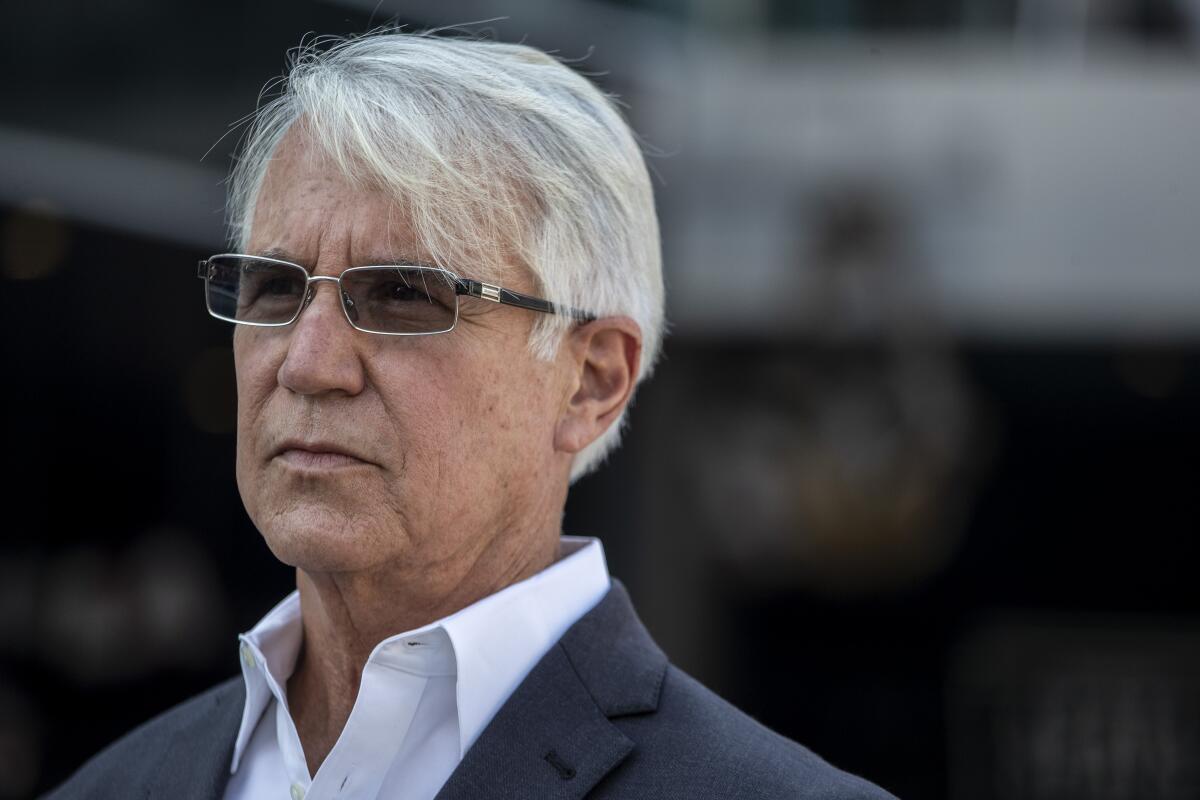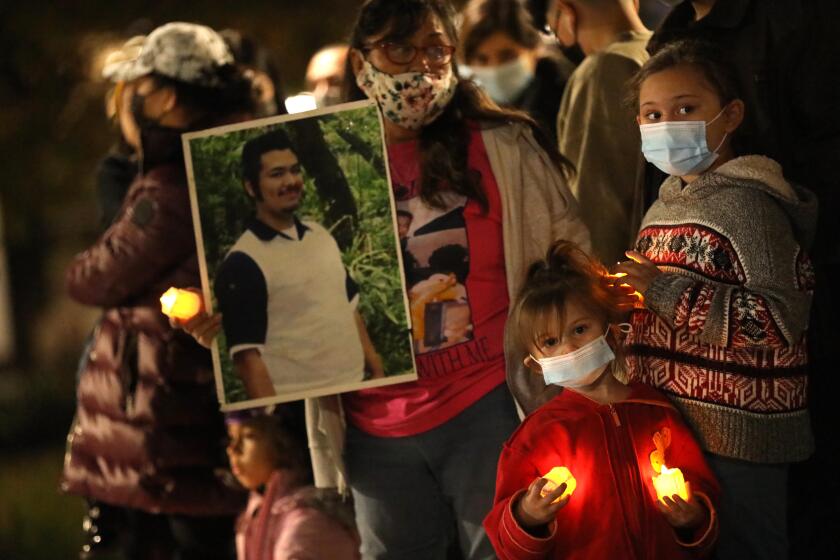An effort to recall Los Angeles D.A. George Gascón is underway: What happens now?

- Share via
It’s been less than six months since reform-minded Los Angeles County Dist. Atty. George Gascón took office. But in that time, he’s already faced lawsuits from his own prosecutors, interference on cases from other California law enforcement leaders and an outcry from some crime victims who claim his policies have abandoned them.
Despite the vitriol, Gascón won his November election handily, besting incumbent Jackie Lacey by more than a quarter-million votes. Gascón’s supporters have dismissed most of the criticisms against him as the result of misguided outrage from reform-resistant law enforcement officials or conservative politicians.
The strength of the backlash against Gascón’s plans to reimagine criminal justice in L.A. County will now be put to the test, as a petition seeking to recall him was formally approved Thursday.
What happened this week?
A petition seeking to remove Gascón from office was approved on Thursday by the L.A. County Registrar, which oversees elections.
What happens now?
Recall organizers must collect signatures of support from 10% of L.A. County’s registered voters — a little more than 579,000 people — by Oct. 27. Gathering signatures is a costly and labor-intensive task, but if organizers succeed, then a recall election will be held. Gascon would be removed from office if a majority of voters choose to recall him and he would be replaced by the candidate who receives the most votes in the recall election.
Roughly 800 people have signed up as volunteer signature gatherers, and another 100 paid gatherers will be deployed “immediately,” according to the recall campaign. A news conference is expected to be held in the coming days, and signature collection sites have been established at dozens of locations around L.A. County, including several gun stores and Republican office buildings.
Because it is common for some signatures gathered in recalls to be deemed invalid, Joshua Spivak, a senior fellow at the Hugh L. Carey Institute for Government Reform at Wagner College, the campaign to recall Gascón will need to collect around a total of 750,000 signatures.
Who is behind the recall effort?
While L.A. County Sheriff Alex Villanueva might be the most high-profile supporter, the recall push is led by former Dist. Atty. Steve Cooley and two women who have lost relatives to violent crime.
Tania Owen is the widow of a murdered L.A. County sheriff’s department sergeant, and Desiree Andrade’s son was murdered in 2018. Both have said they were infuriated by Gascón’s decision to forbid his prosecutors from seeking the death penalty or from alleging special circumstances in murder cases, which means people accused of murder generally will not face the death penalty or life without parole. In Owen’s case, her husband’s killer was still sentenced to life without parole under a negotiated plea, though the deal was struck after a judge deemed some of Gascón’s policies to be unlawful.
George Gascon’s justice revolution and one incendiary question: Who is the victim?
Other elected officials supporting the recall effort include Fresno County Dist. Atty. Lisa Smittcamp and Kern County Dist. Cynthia Zimmer. Campaign finance filings from a group called “Victims of Violent Crime For The Recall of District Attorney Gascon” show financial contributions from police unions in several cities, including Gardena, Beverly Hills, and Glendale. A number of individual Los Angeles police officers and prosecutors have also contributed.
Why do recall organizers dislike Gascón?
The petition alleges “Gascón has abandoned crime victims and their families.”
“Gascón has disregarded the rule of law and weakened lawful sentencing requirements for the most violent criminals, including murderers, armed robbers, and rapists,” the petition continues. “George Gascon’s new policies treat career and repeat violent offenders as if they had never committed a crime, ignoring public safety laws approved by the people.”
Generally, opponents of Gascón have criticized his policies banning the use of the death penalty, ending the prosecution of juveniles as adults, severely limiting the use of sentencing enhancements and barring prosecutors from opposing the release of previously convicted defendants now eligible for parole.
Recall proponents and many local law enforcement leaders have also tried to blame rising crime on Gascón, but violence was already surging in L.A. County in 2020, before Gascón took office. While property crime soared during Gascon’s eight years as San Francisco district attorney, violent crime remained relatively static.
How likely is it the recall will succeed?
Experts and political observers generally see recalls as uphill battles. Both the brevity of Gascón’s time in office and current political headwinds that have seen progressive prosecutors sweep into office throughout the U.S. could pose significant challenges to the effort.
Spivak said this attempt to recall Gascón differs from the one dogging Gov. Gavin Newsom in significant ways.
The campaign to recall Newsom was granted much more time to collect signatures because of the pandemic and was able to mine conservative regions of Northern and Eastern California for support. The effort to take down Gascón, meanwhile, is playing out in a county with a relatively progressive electorate.
A recent UCLA poll, however, found Gascón’s favorability rating was just 31%, compared to 32% unfavorable, earlier this year. And 15 city councils in the county have adopted resolutions of “no confidence” in Gascón in recent months, although they are in cities that account for a relatively small slice of the county’s electorate.
How has Gascón responded?
Max Szabo, Gascón’s spokesman on political matters, has dismissed the recall effort as a fringe right-wing movement that has exploited crime victims.
“This was announced the day of his inauguration,” Szabo said. “There’s a finish line in politics, its called election day. If you lose, train in the off-season and be ready to go next time.”
Szabo pointed to a poll released in March that showed out of 724 crime victims in L.A. County, 61% favored treatment and rehabilitation over incarceration as a form of punishment, suggesting the recall effort was inaccurately framing crime victims as universally opposed to Gascón. Critics have questioned the validity of the poll, noting it was organized by a group that is politically allied with Gascón.
Szabo also said some of the debates leading to the recent no confidence votes were divorced from reality.
“We’ve seen councilmembers make statements that are devoid of fact. They’re either misunderstanding [Gascón’s] directives or completely misstating them,” he said. “We’re hearing how the policies are leading to an increase in crime, but that doesn’t stand up to a modicum of scrutiny.”
More to Read
Sign up for Essential California
The most important California stories and recommendations in your inbox every morning.
You may occasionally receive promotional content from the Los Angeles Times.











